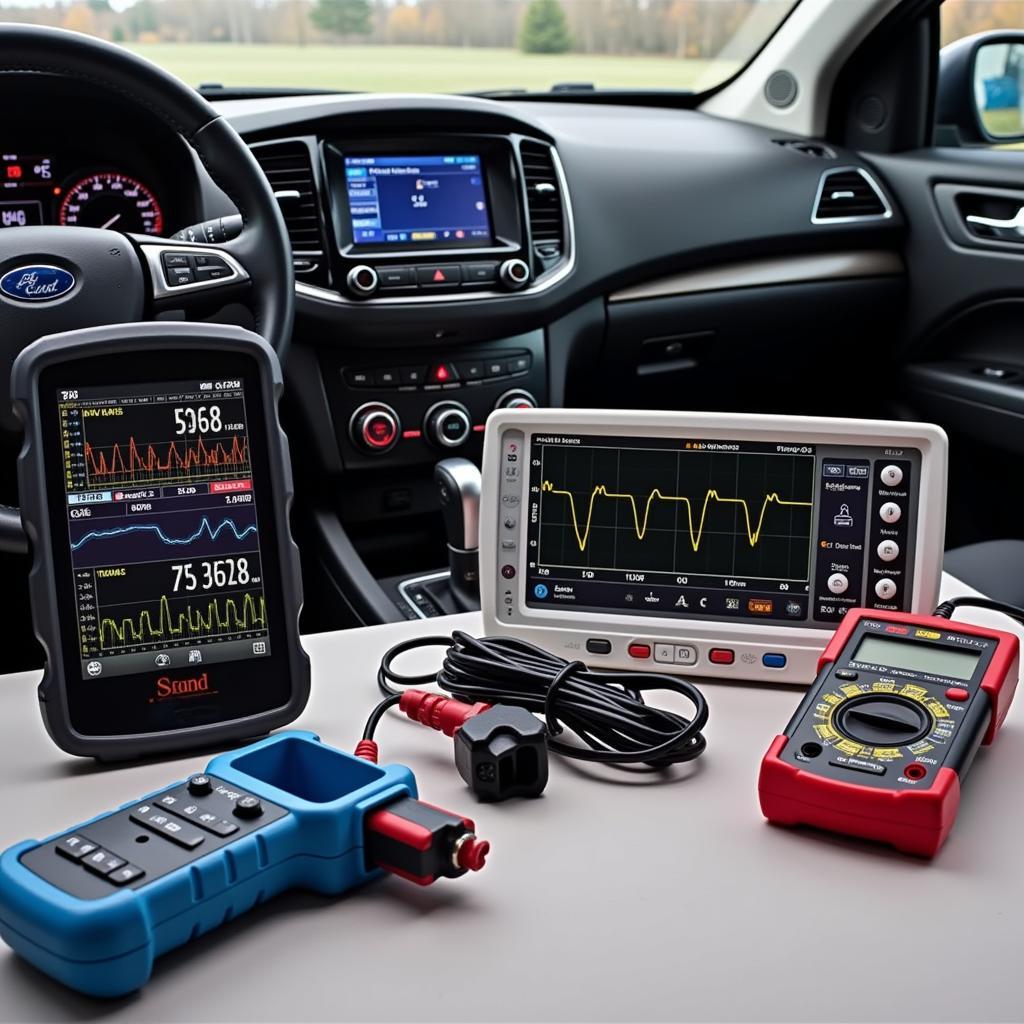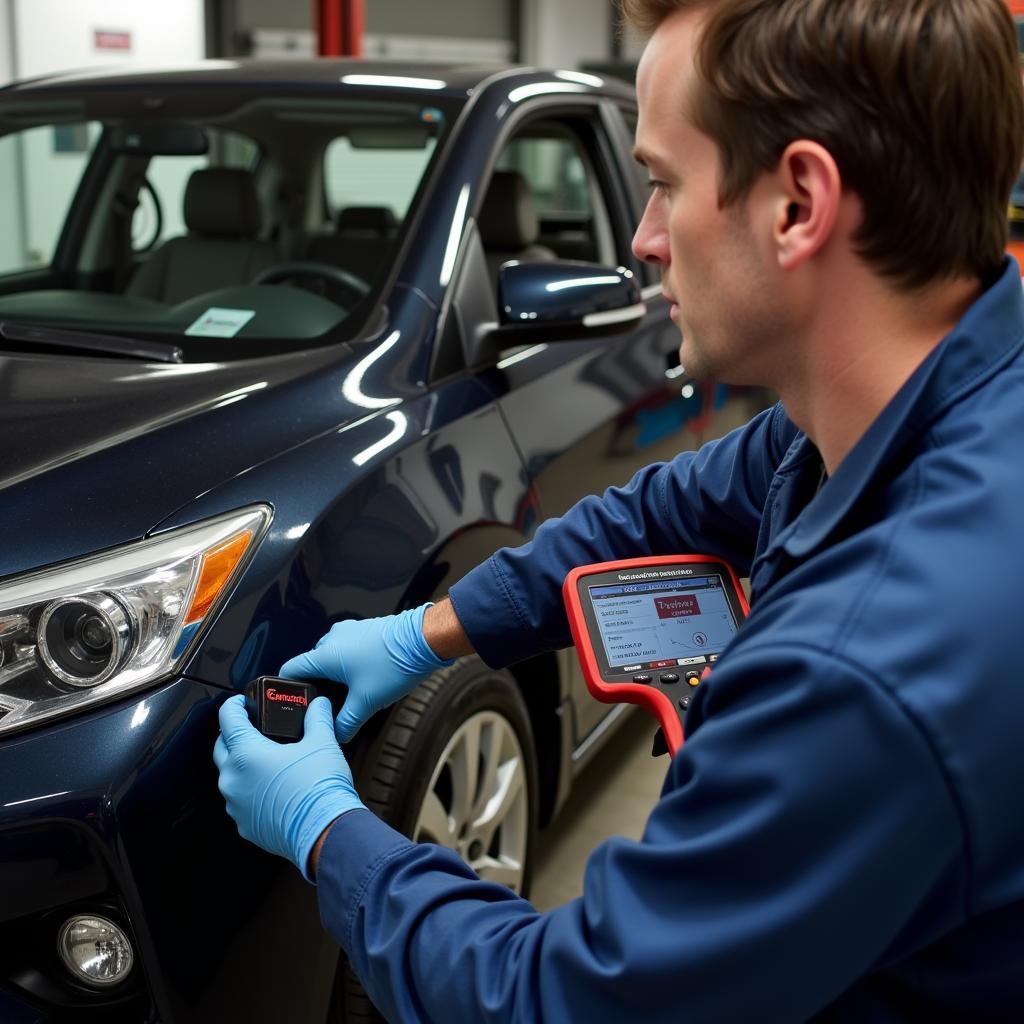Located near 8103 Foxwell Road, Millersville, MD 21108? Experiencing car trouble can be a real headache. Whether it’s a mysterious check engine light, a persistent electrical glitch, or something else entirely, modern vehicles are complex systems, and diagnosing problems often requires specialized software and equipment. This article will guide car owners, repair shop managers, and automotive technicians on how to effectively troubleshoot and resolve common vehicle issues using modern diagnostic tools and techniques.
Understanding Modern Automotive Diagnostics
Today’s cars are more computerized than ever. This means diagnostics have evolved beyond simple visual inspections and multimeter readings. Electronic control units (ECUs) manage virtually every aspect of a vehicle’s performance, from engine timing to airbag deployment. Understanding how these systems interact is crucial for effective troubleshooting. Diagnostics now involve accessing the vehicle’s onboard computer network to retrieve diagnostic trouble codes (DTCs), monitor live data streams, and perform actuator tests. Having the right software and equipment makes all the difference.
 Modern Automotive Diagnostic Tools Connected to a Car's OBD-II Port
Modern Automotive Diagnostic Tools Connected to a Car's OBD-II Port
Choosing the Right Diagnostic Software and Equipment
The market is flooded with various diagnostic tools, ranging from basic code readers to professional-grade scan tools. Selecting the right equipment depends on your specific needs and budget. For the DIY enthusiast, a basic code reader can provide a starting point. However, for professional technicians or repair shops near 8103 Foxwell Road, Millersville, MD 21108, investing in a high-quality scan tool is essential. Look for features like bi-directional control, live data graphing, and comprehensive code databases.
“Investing in the right diagnostic equipment is like buying the right tools for any job. You wouldn’t try to build a house with a screwdriver,” says Michael Stevens, Lead Automotive Technician at Advanced Auto Solutions.
Troubleshooting Common Automotive Problems
Many common car problems can be diagnosed and resolved with the right approach. Let’s take the check engine light as an example.
Diagnosing a Check Engine Light near 8103 Foxwell Road, Millersville, MD 21108
- Connect your scan tool: Plug the scan tool into the vehicle’s OBD-II port, usually located under the dashboard.
- Retrieve DTCs: Use the scan tool to read any stored diagnostic trouble codes.
- Research the codes: Consult a reliable online database or your scan tool’s built-in library to understand what each code means.
- Analyze live data: Monitor real-time data from relevant sensors to pinpoint the root cause of the problem.
- Perform tests: Use the scan tool’s actuator tests to verify component functionality.
“Don’t just throw parts at the problem. A systematic diagnostic approach, combined with the right tools, will save you time and money in the long run,” advises Sarah Johnson, Automotive Electrical Engineer.
Beyond the Basics: Advanced Diagnostic Techniques
For more complex issues, advanced diagnostic techniques may be necessary. This includes using an oscilloscope to analyze electrical signals, a pressure transducer to test fuel pressure, or a smoke machine to detect vacuum leaks. These tools require specialized training and knowledge.
What are Advanced Diagnostic Techniques?
Advanced diagnostic techniques go beyond simple code reading and involve using specialized tools and software to analyze complex vehicle systems. These methods help pinpoint intricate electrical faults, mechanical issues, and performance problems that basic scan tools might miss.
Staying Up-to-Date with Automotive Technology
The automotive industry is constantly evolving. New vehicle technologies and diagnostic procedures emerge regularly. Continuous learning and professional development are vital for staying ahead of the curve. Attending training courses, webinars, and industry conferences can provide valuable knowledge and skills.
Conclusion
Effectively diagnosing and repairing modern vehicles near 8103 Foxwell Road, Millersville, MD 21108 requires the right tools, knowledge, and approach. From basic code readers to advanced scan tools and specialized equipment, investing in the right resources is crucial. Combining this with a systematic diagnostic process and staying up-to-date with the latest automotive technology will empower you to tackle even the most challenging car problems.
For expert advice and support, connect with ScanToolUS.
Contact us at +1 (641) 206-8880 or visit our office at 1615 S Laramie Ave, Cicero, IL 60804, USA.
FAQ
- What is an OBD-II port? The OBD-II port is a standardized connector found in most vehicles manufactured after 1996, used to access the vehicle’s diagnostic system.
- What are diagnostic trouble codes (DTCs)? DTCs are alphanumeric codes that indicate specific malfunctions within a vehicle’s systems.
- What is a scan tool? A scan tool is an electronic device used to retrieve DTCs, monitor live data, and perform tests on a vehicle’s systems.
- Do I need a professional scan tool? While a basic code reader can be helpful, a professional scan tool offers more advanced features for comprehensive diagnostics.
- How can I stay updated on automotive diagnostic techniques? Attending training courses, webinars, and industry conferences can help you stay current with the latest technologies and procedures.
- What if I can’t find the problem after scanning for codes? Some issues require more advanced diagnostic techniques and tools. Consulting a qualified technician is recommended in these cases.
- Where can I find reliable information about diagnostic trouble codes? Reputable online databases and your scan tool’s documentation are valuable resources for understanding DTCs.

